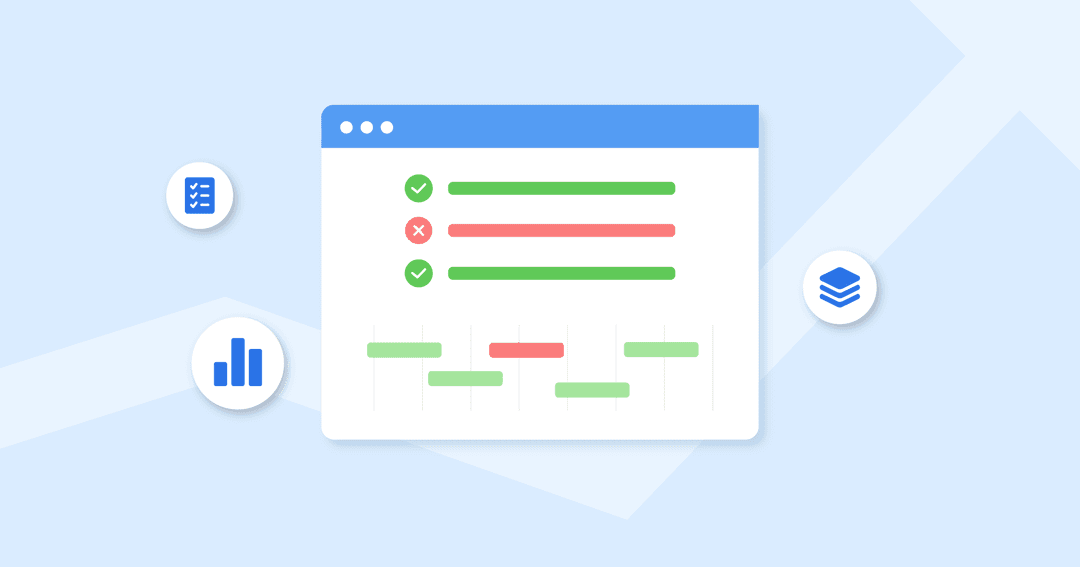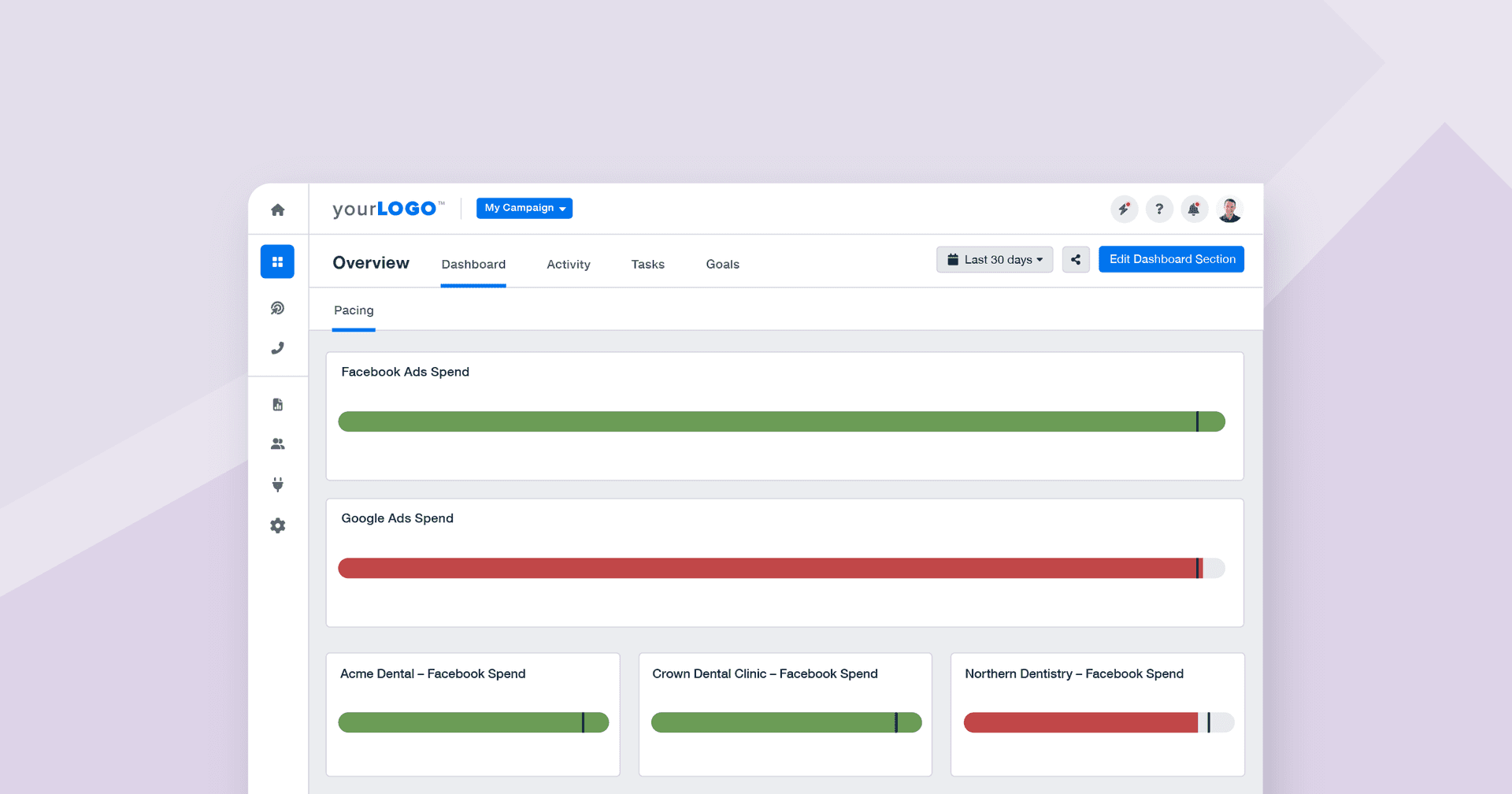Table of Contents
QUICK SUMMARY:
An agency project management checklist ensures that client projects stay on track, within budget, and aligned with key performance indicators. Further, agency leaders benefit from implementing project management strategies–after all, streamlining processes frees up your time to focus on what really matters. From client onboarding to resource allocation, this article outlines the best approach and provides an example project management checklist for your agency.
Picture this: Your agency is working at max capacity, but there’s a sense of calm, cool confidence floating around the office. Rather than the team running around with their proverbial hair on fire, you notice that deadlines are being met, clients are approving projects in a timely manner, positive results are rolling in, and the team feels challenged yet relaxed with a well-balanced workload.
Sound like a fairytale? We get it. As a busy agency leader, you simply don’t have time to be micromanaging every little project that comes across your desk to make sure it goes off without a hitch. The good news is that implementing project management strategies across the agency will allow you to take a step back and focus your attention on the activities that will drive the business forward, ultimately helping the agency scale faster.
At the end of the day, it’s all about:
Understanding what project management techniques address common agency problems.
Choosing the right project management tools to fit how you and your clients work together.
And implementing some simple project checklists to streamline and organize your initiatives, from project kickoff to handoff.
Let’s dive in.
Why Is Project Management Important for Marketing Agencies?
Digital marketing agencies are master jugglers, balancing multiple projects in a fast-paced and dynamic environment. Successful project management means keeping track of all these moving parts so that work is delivered on time and budget while meeting campaign goals.
Agencies use effective project management to forecast and react to evolving challenges and properly allocate resources, control risks, manage indirect and direct costs, and deliver high-quality work.
Streamlining processes with the right project management approach improves communication for better decision-making and strategic alignment. It empowers your agency to hone that competitive edge by being flexible, adaptable and making the most of billable hours for your clients.
The most important measure we put in place is our shared project management system for our internal team, and we created real time live analytic dashboards for our clients with 24/7 access to see ROI and our work! We also do monthly zoom meetings with clients, weekly team zoom meetings, and weekly email updates with clients.
Jim Vinyard, CEO and CCO, Vinyard Creative Group
Project Management Solutions To Overcome Common Agency Challenges
Perhaps the best thing about project management strategy within an agency context is that, when properly implemented, it serves as a solution for myriad day to day struggles that prevent agencies from scaling.
Whether your agency’s biggest bottlenecks take place during client onboarding, approval and sign-offs, resourcing, or invoicing, chances are there’s a project management solution that will streamline and eliminate existing hurdles.
Building out infrastructure was so important early on. I understood the value of having good systems in place to communicate and track work, even when we were just three people. After that, my first full-time hire was a Project Manager to help keep on track of all our clients and tasks.
Part of infrastructure building was also investing in software, like AgencyAnalytics, to see all metrics in one place. Infrastructure building helped us grow because there wasn't wasted time searching for something stuck in one person's email inbox. It also allowed us to become more responsive to clients which leads to better quality work.
Yanira M. Castro, CEO, Humanity Communications Collective
Let’s take a look at some of the most common agency challenges, and examples of how project management will alleviate the burden.
New Client Onboarding
Eager to impress a new client, an agency might simply hold a quick kickoff meeting before diving into campaign execution. Not having a robust enough new client onboarding process–with adequate time for discovery, campaign implementation and design–often leads to misunderstanding a client’s goals and vision, requiring costly rework down the road.
The Agency Project Management Solution
Consider using a new client onboarding checklist that digs deep to uncover critical information like key performance indicators, and establish a thorough understanding of the client’s business needs.
A checklist with documented discovery and marketing scorecards to grade and track initiatives speeds up the onboarding process, ensuring all clients receive the same level of care, and perfecting strategy the first time around. Not only does this mitigate the risk of scope creep from misaligned deliverables, but it also goes a long way to building a rock-steady relationship and setting clear expectations for both parties.
Impress clients and save hours with custom, automated reporting.
Join 7,000+ agencies that create reports in minutes instead of hours using AgencyAnalytics. Get started for free. No credit card required.
Accurate Budget Forecasting
Accurate budget forecasting is challenging because of the unpredictable nature of client demands and market trends. How many times has your team sat down to work on what the client insisted was a “quick and easy project”, only to have the details change 5 times once work begins?
When a simple Instagram carousel somehow morphs into a feature-film-worthy Reel complete with craft services, the budget soars… and without adequate planning, it’s easy for the increased costs to place a strain on the agency-client relationship.
The Agency Project Management Solution
By establishing clear project scopes, timelines, and deliverables, agencies better anticipate resource requirements and associated costs. Leveraging project management tools and software for budget tracking and forecasting enables real-time adjustments to budget estimates based on emerging trends or changing client priorities–keeping clients in the loop.
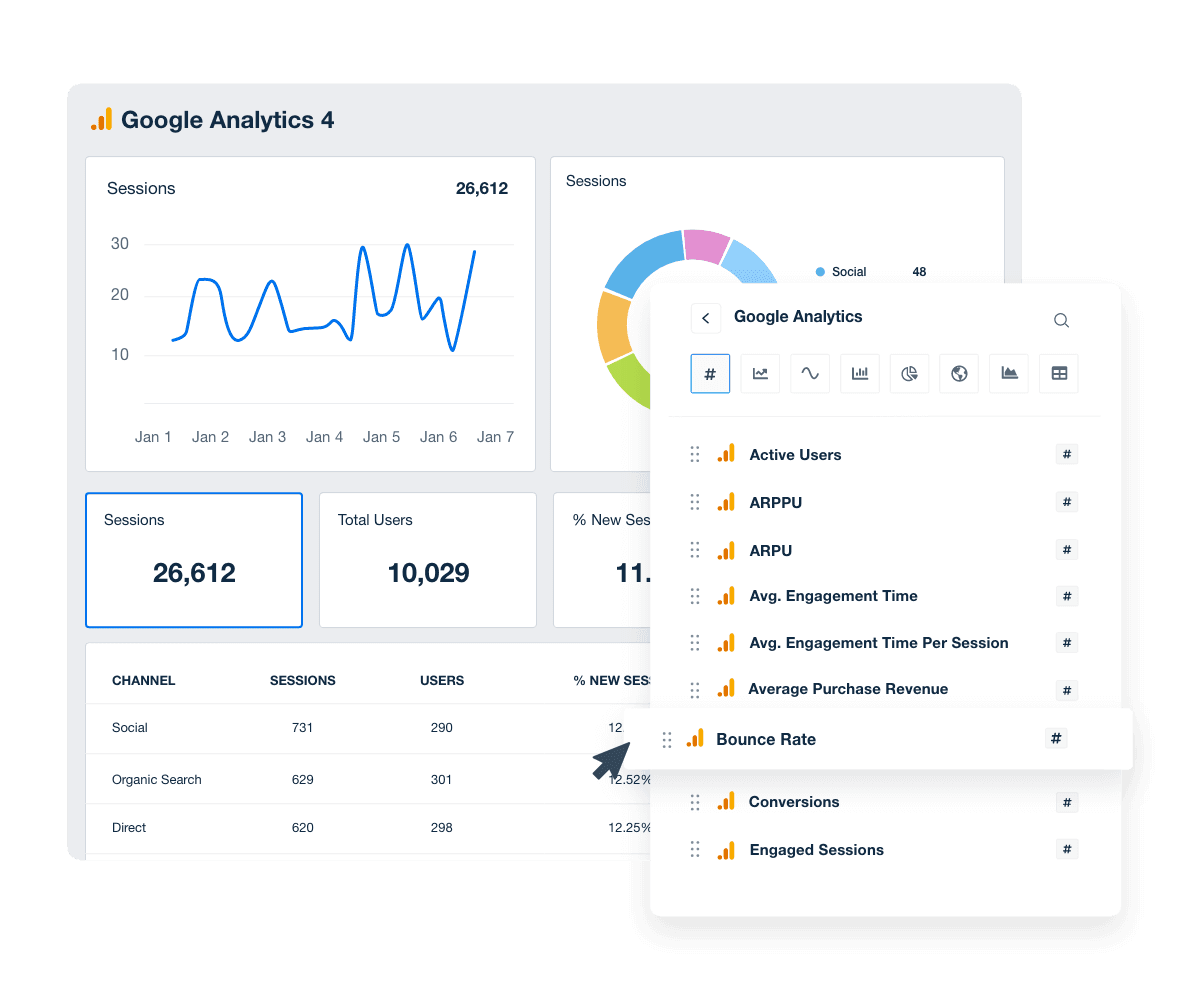
Regular campaign performance check-ins using reports and dashboards built with AgencyAnalytics reassure clients that budget spend is progressing according to plan, while delivering the desired results. Sign up for a free 14-day trial today!
Long Stakeholder Approval Times
Very rarely do the stars align and all agency team members and client stakeholders unanimously agree, embracing an asset or campaign with no revisions. The reality is that numerous stakeholders mean conflicting opinions with round after round of feedback that eats away at already tight timelines.
The Agency Project Management Solution
The goal is to get sign-off quickly while streamlining changes, and make sure everyone is on the same page in a timely manner. Having an effective marketing approval process in place makes things a whole lot easier and faster. As part of your approvals process, set firm due dates so you’re not making multiple amendments that drag on with no end in sight. Providing content for review in bulk also makes it easier for clients to carve out time to approve everything in one sitting.
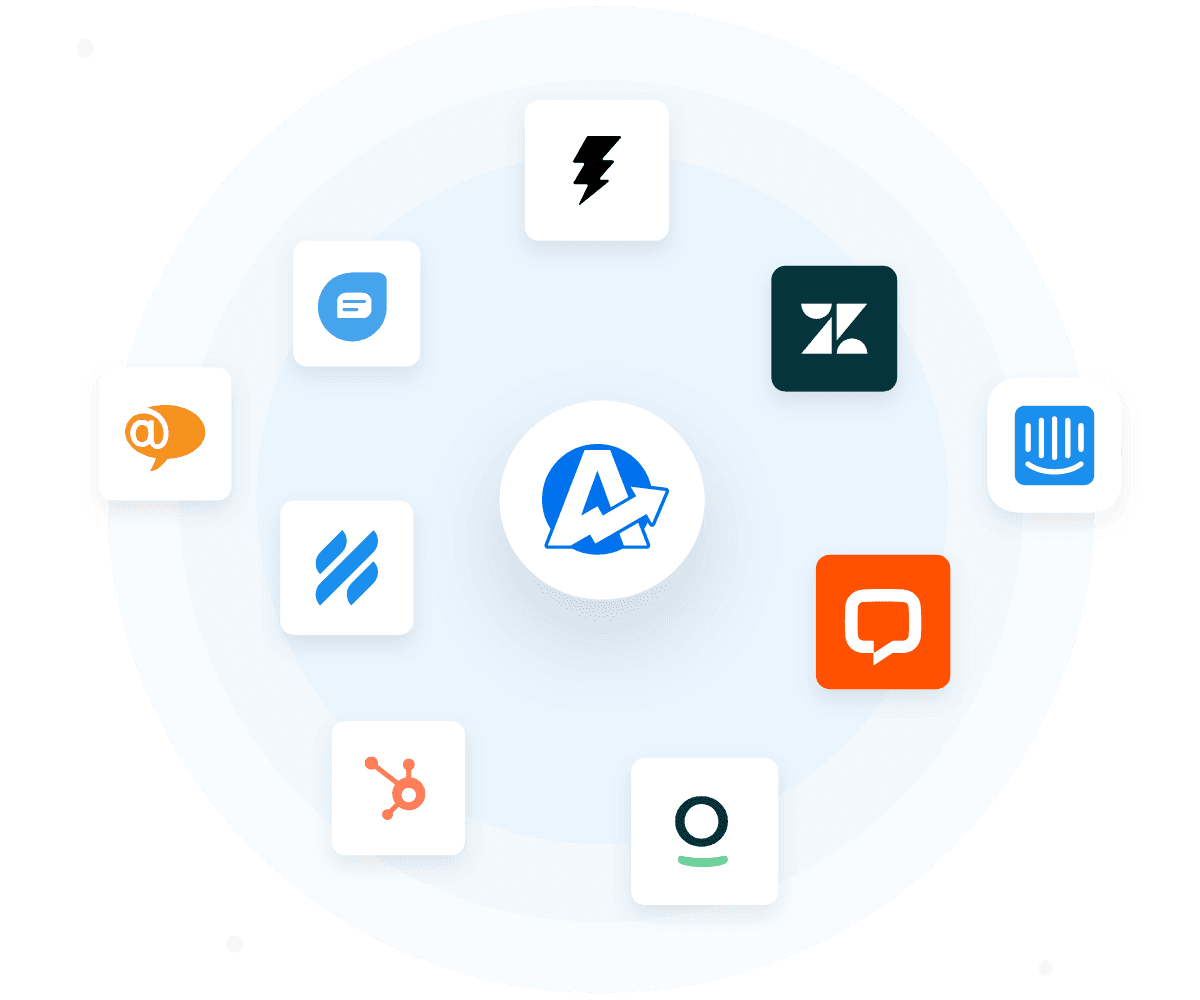
Integrate with popular messaging platforms and communicate about asset approval from right within AgencyAnalytics! Try it free for 14 days.
Client Billing Confusion
Historically, marketing agencies have typically invoiced ‘in arrears’, after the service has been delivered. This gets complicated when a project drags on…and on and on. When exactly is a project “done”? In recent years, it’s become more common for agencies to bill via an up-front deposit, ongoing retainer, or even subscription service–all options that ensure that cash flow keeps flowing even when a never-ending project threatens to drain the life out of the team.
That said, regardless of your agency’s invoicing structure, billing late for previous projects completed weeks or months earlier, unclear payment terms, or scope creep will lead to problems. Further, delayed invoicing causes frustration for clients when late invoices disrupt their financial planning and cash flow, straining your relationship.
The Agency Project Management Solution
Utilize the automation and tracking tools in your invoicing management software to their greatest effect to send invoices out promptly and on a regular schedule to customers. Provide as much clear and detailed information as possible to dispel confusion and minimize disputes.
Agencies need to break down how billable hours were spent and adequately explain additional charges for expanded scope of work requests as clients are likely to question any ambiguous line items. Implementing a time-tracking app that integrates with your resource management platform or invoicing solution is another great way to gain visibility into how much time was spent on each account, further speeding up your invoicing process.
We constantly evaluated and refined our internal processes to eliminate bottlenecks and enhance productivity. By streamlining workflows, we could handle higher project volumes without sacrificing attention to detail.
Jessica Crist, Production Manager, High Five Media
Adequate Resource Management
At your agency, no two days are ever the same. Whether you’re powering through a mega-project, or smaller routine tasks, you need to be able to shift resources, people and focus on the fly.
It’s no surprise that the AgencyAnalytics Benchmarks Survey found that time management was the top challenge faced by agencies today. With so many plates spinning in the air at any given time, pivoting and adapting to new circumstances is a challenge.
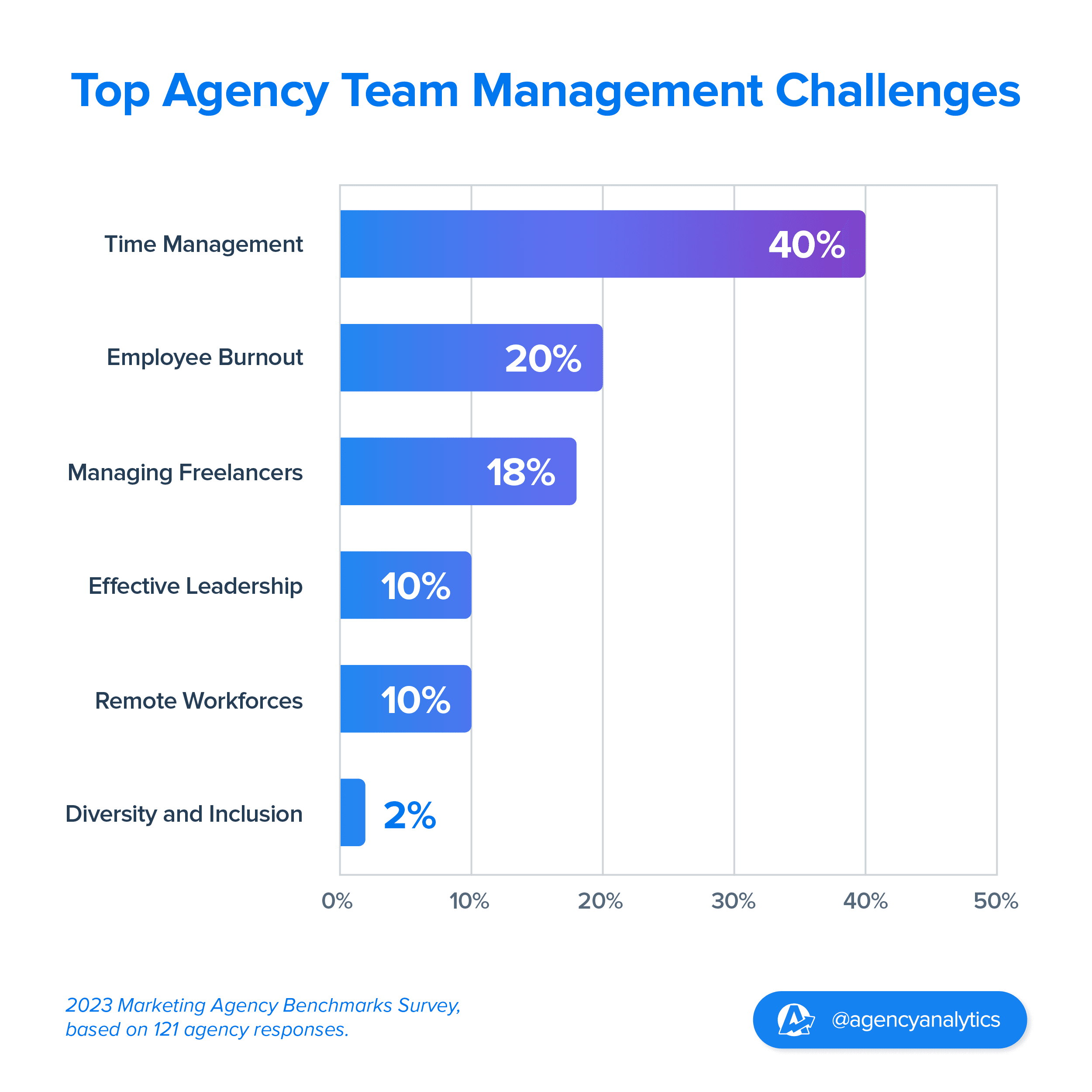
A well-managed agency evenly balances the current workload and evaluates if potential projects can be accommodated. Otherwise, productivity flags and staff are at risk of burnout–the second largest team management challenge of agencies today.
The Agency Project Management Solution
In this situation, establishing a robust resource management process is the answer. This approach, which may include an automated digital resource management system, identifies all available resources and assigns tasks to projects based on requirements to improve efficiency, cut costs, and maximize output.
Planning and continuous monitoring are other big components that quickly shift resources to handle changing project priorities and keep the agency working at full capacity. Adopting an agile project methodology, like scrum or hybrid, promotes flexibility by breaking work into manageable chunks called ‘sprints’ so teams can respond to rapidly changing requirements or priorities.
Organizing, Storing, Securing and Accessing Digital Files
Oh, the wild wild west that a marketing drive can quickly devolve into. A thousand iterations of a single graphic, feedback logs, raw source material, design files, you name it. And don’t say “file naming conventions” into a mirror three times, no one wants to summon that beast. Needless to say, finding a way to store and secure files that allows for quick location and sharing is a common agency challenge.
The Agency Project Management Solution
Get organized and work more efficiently with a well-defined file management strategy and a digital asset management (DAM) system. The main goal is to be able to manage multiple clients’ content in a centralized location using a standardized folder structure that categorizes files by client, project, campaign, or asset type. Some of the most valuable DAM tools to consider implementing include metadata tagging to make files more searchable, version control to track revision and updates, and access controls to share client-confidential files with the right people.
Managing Change Requests To Avoid Scope Creep
Some change requests are handled by a quick phone call or a short email. However, more complex feedback or high-level requests impact an entire project’s scope, budget, and timeline.
You don’t want to rely on memory or scribbled meeting notes when bringing those edits back to the team. Particularly if your agency has a client that’s notorious for changing their mind throughout the execution phase of projects, an early focus on project management strategy is necessary to avoid straining the relationship and losing valuable billable time.
The biggest challenge recently was choosing the right client and project management software. The existing software that we were using was great in the beginning but we had simply outgrown it. After 3-months of review and testing, of twenty-something platforms we found the software that is going to enable us to provide a higher level of customer service, and communication. Massive improvement to our processes, and efficiencies for project and resource management. Most importantly, ease of access to complete oversight of all areas of the business.
Calum Maxwell, Managing Director, Optimise Online
The Agency Project Management Solution
A clear change request management process, beginning with a change request form, provides a precise grasp on the full impact of a given change and controls scope creep by identifying, documenting and resolving project change requests as they are filed.
When filling out a change request form, internal and external stakeholders must describe:
The scope of change and what is needed to implement it.
The rationale behind why the change should be made.
The potential benefits of making the change.
Once submitted, the agency project manager will review and determine the impacts of incorporating the proposed revisions, work with senior agency leadership to approve or deny the request, and lead any amendments.
Effective Milestone Tracking
Milestones are hard to grab hold of if you don’t pay constant attention to them. Left unchecked, they’re just fleeting moments of achievement or critical decision-making that slip silently by. Usually, the campaign go-live is the critical project milestone for clients– it’s harder to muster up that same level of enthusiasm for the first performance review, but it’s no less important.
We faced some client management challenges due to a rapidly expanding client base. To ensure quality service delivery and client satisfaction, we implemented robust project management systems and adopted a more data-driven approach. This allowed us to monitor our campaigns more efficiently, make necessary adjustments promptly, and provide our clients with insightful reports and recommendations.
Joseph LeBlanc, Marketing Specialist, Studio Eighty-Eight
The Agency Project Management Solution
After the campaign has gone live, it’s crucial to regularly review project milestones and measure key performance indicators against campaign objectives to gauge project success and identify areas of improvement. Utilizing a project management tool that automates and schedules reports that display milestone tracking makes this process a breeze.
With AgencyAnalytics’ white label reporting tool, automatically create and schedule branded reports that display your clients' critical performance metrics, and plot the project progress towards milestones in a straightforward, visually appealing format.
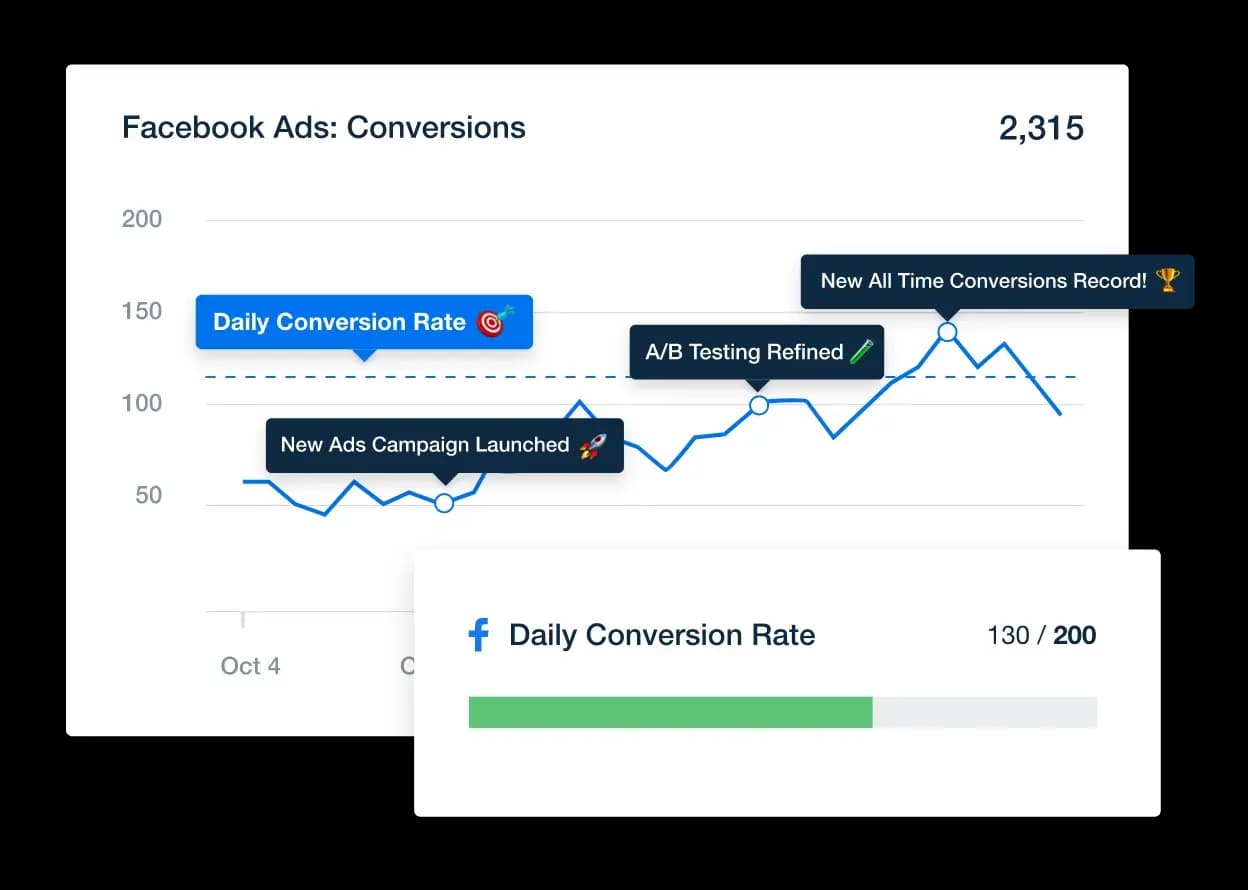
Create custom goals that visually display progress, so clients understand wins and challenges. Set up your own trial dashboard–try AgencyAnalytics free for 14 days.
7 Essential Components of an Agency Project Management Checklist
Project managers recognize that project planning and monitoring are essential to a successful project. Though project managers undoubtedly juggle a massive workload consisting of myriad puzzle pieces, it’s amazing how helpful a simple checklist is in keeping tabs on tasks.
Below, we’ve compiled a simple project checklist divided into phases. Tailor it to match specific project requirements and integrate your various software solutions. By utilizing a project management checklist template for consistency and ease of use, anyone from scrum master to project leader will be able to gauge whether the agency is in for smooth sailing or all hands on deck.
1. Project Initiation
During the first phase of project management, the agency collaborates closely with the client to:
Understand client needs.
Develop a comprehensive project brief with clear goals and objectives.
Establish measurable KPIs.
Developing a rough project plan, including basic milestones.
Identify stakeholders and determine contacts for approvals.
2. Scope and Timeline
Defining the project scope and timeline involves:
Assessing the project's lifecycle and any hard due dates.
Breaking down project goals into specific deliverables.
Determining what is required to achieve these objectives, including resources and financial considerations.
Establish the budget
Categorize and add up all the direct and indirect costs necessary to complete the project.
Consider labor, equipment and ad spend.
Gain approval on the budget and establish a system of checks and balances with the client to stay on track.
Setting firm, attainable milestones within a realistic timeline.
Agency Tip: Make sure that each task has an assigned deadline in your agency project schedule to maintain momentum and ensure everything stays on track.
3. Resource Allocation
Understaffing or underskilling is a sure way to crush a project. That’s why it’s critical to ensure sufficient resources, including staff, equipment and material, are assigned to support the project. In this stage, establish:
A work breakdown structure, including a cascading deconstruction of deliverable work tasks.
The resources needed in each phase, including any additional tech or external vendors.
Potential bottlenecks, and a rough mitigation plan.
The final configuration of the project team, carefully considering the availability and expertise of team members when assigning tasks.
Agency Tip: Project efficiency relies on how well resources are utilized and if deadlines are attainable thanks to balanced workloads.
4. Communication
By some estimates, project managers spend 75 to 90% of their time communicating so it makes sense that from all the management checklists, creating a communication plan is among the most highly recommended. In this stage:
Identify stakeholder communication needs, setting up the best communication channels.
Arrange your meeting schedule, and inform clients of how you will be gathering and communicating their results.
Automate and schedule your reports, so that the client knows when to expect project updates.
According to the AgencyAnalytics Marketing Agency Benchmarks Survey, the top factor influencing client retention is transparency. A communication plan ensures that the agency maintains effective and consistent communication with the client, and establishes feedback channels to foster collaboration and address any issues that may pop up.
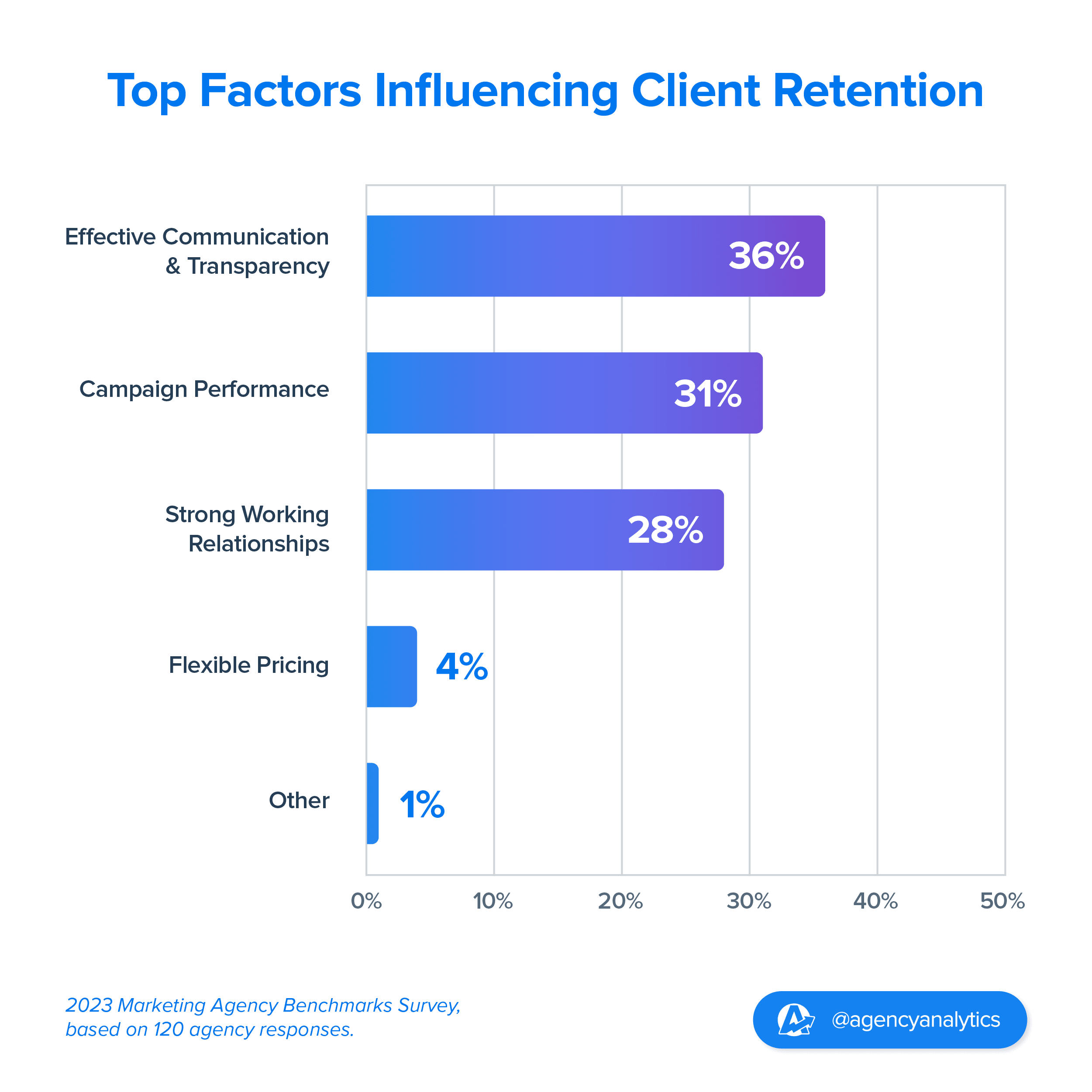
5. Budget Tracking
Once the project budget is set and the project is underway, it’s time to identify and address the most common issue in project management: cost overruns.
Monitor expenses by reviewing budget estimates.
Track expenses and billable hours.
Conduct financial audits.
Follow an established change order protocol to address scope change and proactively manage cost deviations.
6. Risk Management
Effective agency project management involves proactively identifying potential risks and developing contingency strategies as a part of your risk management plan.
Identify and anticipate potential challenges and bottlenecks, and remain open in communicating these to clients.
Implement proactive measures to ensure timely delivery and client satisfaction.
Keep in mind that many risks are related to incomplete or missing project steps, not big, nebulous external threats.
Frequently refer back to your work breakdowns and timelines to ensure that teams are completing work on time, and in the correct order.
7. Review and Optimization
By learning from past experiences and continuously refining your approach, your agency will enhance efficiency and deliver even better results with future projects. Once you've achieved a successful project completion , it’s time to:
Conduct a thorough post-project analysis to evaluate project performance.
Identify areas for improvement.
Determine a plan to optimize project management processes and improve in the future.
Conclusion
Today, we talked a lot about project management checklists and ticking off project tasks. Listen–the role of the agency project manager often looks like checklists on checklists on checklists–it’s why the creative folks so deeply value the PM's contributions: so that we can keep our minds on the flow of fresh ideas and interesting executions.
But let’s bring it back to basics. Think ‘nice pair of dress pants and a crisp white shirt’ basics: Ultimately, the key to effective agency project management boils down to good old fashioned communication, and delivering projects that drive real business outcomes.
With AgencyAnalytics, agencies harness the power of data to track milestones, measure performance, and communicate results with clarity and confidence. It’s an essential tool in your project management toolbox, purpose-built for marketing agencies just like yours.
Using our intuitive reporting features, more than 7,000 agency teams are empowered to make informed decisions, adapt strategies on the fly, and demonstrate the tangible value they bring to clients. See how easy AgencyAnalytics is for yourself, try us free for 14 days!

Written by
Lia Van Baalen is a Canadian content marketer with a decade of experience writing B2B content for SaaS, manufacturing and renewable energy companies. In her opinion, nothing is quite so satisfying in marketing as a good subject matter interview.
Read more posts by Lia Van BaalenSee how 7,000+ marketing agencies help clients win
Free 14-day trial. No credit card required.



